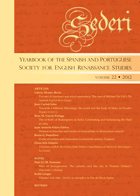
Sederi 22
Sederi 22 — 2012
EDITORS
Berta Cano Echevarría & Ana Sáez-Hidalgo
REVIEW EDITOR
Francisco J. Borge López
ISSN 1135-7789
Rosa M. García-Periago, “The re-birth of Shakespeare in India: celebrating and Indianizing the Bard in 1964.” SEDERI 22 (2012): 51-68.
DOI: https://doi.org/10.34136/sederi.2012.3 Download PDF
Abstract
While the Tercentenary of Shakespeare’s death (1916) was hardly celebrated in India and marked the beginning of a period in which Shakespeare was hidden, the Quartercentenary of his birth (1964) spawned a large number of collections, theatre performances and even exhibitions to pay homage to the Bard. Although a special issue of the journal Indian Literature published in 1964 contributed to the re-emergence of Shakespeare, the most revolutionary projects in the making of a vernacular Shakespeare occurred on the Indian stage via Utpal Dutt’s Shakespearean productions in Bengali. Following Arjun Appadurai, this paper argues that Utpal Dutt’s Bengali theatre productions in 1964 participate in a “decolonization” of Shakespeare, consisting in liberating Shakespeare “the text” and Shakespeare “the author” from the bonds of the empire, from restrictive colonial associations. Two out of his three theatre performances produced in 1964 – Romeo and Juliet and Julius Caesar – are symptomatic of the effects of “glocalizing” the Shakespearean texts since the original place names and names of the characters are combined with the Bengali language and some unavoidable localization. Thus, Shakespeare’s Quartercentenary in India not only saw the re-emergence of the Bard, but also took its first steps in his indigenization.
Keywords: Shakespeare; appropriation; theatre performances; Quartercentenary; India.
References
Anzai, Tetsuo, Soji Iwasaki and Peter Milward eds. 1999. Shakespeare in Japan. Lewiston, N.Y.: Edwin Mellen.
Appadurai, Arjun 1996. Modernity at Large. Minnesota: University of Minnesota Press.
Bhabha, Homi 1994. The Location of Culture. London and New York: Routledge.
Bharucha, Rustom 1983. Rehearsals of Revolution: The Political Theater of Bengal. Hawaii: Hawaii University Press.
Bhattacharya, S. K. 1964. “Shakespeare and the Bengali Theatre.” Indian Literature 7: 27-40.
Calvo, Clara 2010. “Commemorating Shakespeare and Wartime Europe: Julius Caesar in 1916.” Ed. Antonio Moreno Hernández. Julio César, Textos, Contextos y Recepción: de la Roma Clásica al Mundo Actual. Madrid: Universidad Nacional de Educación a Distancia: 493-506.
Dutt, Utpal 1999 (1964). “Taking Shakespeare to the Common Man.” Epic Theatre (1999): 19.
Gupta, Somanatha 2005. The Parsi Theatre: Its Origins and Development. Edited and translated by Kathryn Hansen. Calcutta: Seagull books.
Gupta, Tapati 2005. “Utpal Dutt’s Plays.” Muse India: The Literary Journal 4.
<url: http://www.museindia.com/viewarticle.asp?myr=2005&issid= 4&id=124>. Last accessed 03/10/2011.
Gupta, Tap 2010. “From Proscenium to Paddy Fields: Utpal Dutt’s Shakespeare Jatra.” Eds. Poonam Trivedi and Minami Ryuta. Re-playing Shakespeare in Asia. New York and London: Routledge: 157-180.
Huo, Jiangi, dir. 2005. Qing ren jie (aka A Time to Love). Perf. Wei Zhao and Yi Lu. PKU Starlight Group, Starlight International Media. Film.
Indian Literature, Journal of the Sahitya Akademi or Academy of Letters, Delhi, 7.1, 1964.
Ivory, James dir. 1965. Shakespeare Wallah. Perf. Geoffrey Kendal, Sashi Kapoor, Felicity Kendal, Jennifer Kendal, Geoffrey Kendal, Laura Kendal, Madhur Jeffrey and Utpal Dutt. Merchant Ivory Productions. Film.
Kapadia, Parmita 2008. “Jatra Shakespeare: Indigenous Indian Theater and the Postcolonial Stage.” Eds. Craig Dionne and Parmita Kapadia. Native Shakespeares: Indigenous Appropriations on a Global Stage. Surrey: Ashgate: 91-104.
Kendal, Geoffrey 1986. The Shakespeare Wallah: The Autobiography of Geoffrey Kendal /with Clare Colvin, Introduction by Felicity Kendal. London: Sidgwick & Jackson.
Lal, Ananda ed. 2009. Theatres of India. New Delhi: Oxford University Press.
Lanier, Douglas 2012. “Marketing.” Ed. Arthur F. Kinney. The Oxford Handbook of Shakespeare. Oxford: Oxford University Press: 499-515.
Levith, Murray 2004. Shakespeare in China. New York: Continuum.
Li, Ruru 2003. Shashibiya: Staging Shakespeare in China. Hong Kong: Hong Kong University Press.
Narasimhaiah, C. D. 1964. Shakespeare Came to India. Bombay: Popular Prakashan.
Olivier, Laurence dir. 1948. Hamlet. Perf. Laurence Olivier, Jean Simmons and John Laurie. Two Cities Films. Film.
Oxygen News, Special Shakespeare number. Kolkata. 1964.
Paul, Rajinder ed. 2006. Contemporary Indian Theatre: Interviews with Playwrights and Directors. New Delhi: Sangeet Natak Akademi, Hope India Publications.
Paul, Sunita 1989. A Tribute to Shakespeare. New Delhi: Theatre and Television Associates.
Sahu, Kishore dir. 1954. Hamlet. Perf. Mala Sinha, Pradeep Kumar and Kishore Sahu. Hindustan Chitra. Film.
Sen, Aparna, dir. 1981. 36 Chowringhee Lane. Perf. Jennifer Kendal, Dhritiman Chatterjee and Debashree Roy. Film-Valas. Film.
Singh, Jyotsna 1996. Colonial Narratives: Discoveries of India in the Language of Colonialism. London: Routledge.
Sisson, Charles 1926. Shakespeare in India: Popular Adaptations on the Bombay Stage. London: The Shakespeare Association.
Trivedi, Harish 1995. Colonial Transactions: English Literature and India. Manchester: Manchester University Press.
Trivedi, Poonam and Dennis Bartholomeusz eds. 2006. India’s Shakespeare: Translation, Interpretation and Performance. New Delhi: Pearson Longman.
Zefirelli, Franco dir. 1968 Romeo and Juliet. Perf. Leonard Whiting, Olivia Hussey, John McEnery, Milo O’Shea and Pat Heywood. BHE Films, Verona Produzione, Dino de Laurentiis Cinematografica. Film.
Web Resources
Shakespeare in India – Bibliography (at Internet Shakespeare editions website): url: http://internetshakespeare.uvic.ca/Library/Criticism/shakespearein/india7.html (Last accessed 07/08/2011).
